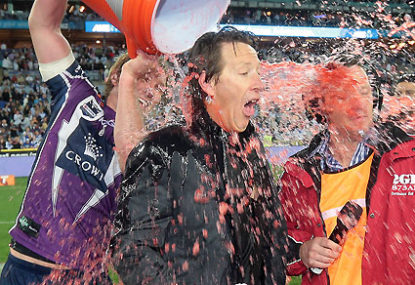Commentators frustrated at Super League video ref process that forces officials to 'guess'
Patrick Mago was ruled to have knocked on, in a decision that was then supported by the video ref, but the commentators think that…

NRL coaches tend to have short careers with high stress and high accountability, even for factors outside their control.
In Part 1 we looked at Peter Sterling’s decision to opt for a media career. What can we learn comparing Craig Bellamy’s exit and Geoff Toovey’s current dilemma?
Study 2: Craig Bellamy
Bellamy played 148 games with Canberra from 1982 to 1992 under Don Furner (1982–87), Wayne Bennett (1987) and Tim Sheens (1988–92).
He rose from Wayne Bennet’s assistant at Brisbane to head coach at Melbourne in 2003. His impact was immediate.
He gained Country coaching honours in just his third season, led Melbourne to three minor premierships from 2006-08 (subsequently stripped) and two premierships in 2007-09 (also stripped). He was 2009 RLIF Coach of the Year, and secured the 2010 World Club Challenge.
One mountain he couldn’t climb was State of Origin, quitting as NSW coach in 2010 with a record of two wins from nine games.
Melbourne were minor premiers in 2011, premiers in 2012 and World Club Champions in 2013.
Like Sterlo before him, he published an autobiography in 2013. He passed 300 games as coach in 2014.
Today he is among the game’s most respected figures. Again and again we’ve seen journeymen lift playing under him at the Storm (think Blake Green, Marika Koroibete), while again and again, those leaving on lucrative contrasts have underwhelmed (Adam Blair).
Though his pre-seasons are notoriously tough, ‘Bellyache’ enjoys close player relationships. His work on the ruck, and recruiting around a ‘Big 3′ have been highly influential. His assistant coaches have gone onto lead New Zealand, the Eels and Rabbitohs.
In 2013 it was revealed he’d had a brain scan following bouts of dizziness before their Newcastle semi-final. He denied that it was stress related, noting, “it’s my 10th finals campaign so I don’t know why it should be any different.”
Despite massive bids from the Dragons and Warriors, he signed a final three-year deal with Melbourne for 2014-16, and announced his intention to step down.
“I’ve still got a few years to go in this contract here and I think when that contract finishes, that that’ll be the end of me as well,” he told MMM, making him one of the select few to leave in their prime and on their terms.
He has solved the coach’s dilemma.
Study 3: Geoff Toovey
We’ve seen greats like Peter Sterling decline coaching honours. We’ve seen Craig Bellamy manage his exit with absolute clarity. What insight does this offer others?
Hailed as one of the game’s toughest players, Geoff Toovey’s career spanned almost 15 years. The local Manly junior played 286 games including two premierships (one as captain), 16 matches for NSW (including the ’97 series as captain) and 13 Test matches.
He earned a degree in business at UTS while playing, and worked for 10 years as a chartered accountant with Crispen and Geoffrey, and spent a decade on the NRMA board.
“I’m keen to keep my hand in the business area, knowing there’s life after coaching,” he noted.
Toovey became Manly’s coach in 2012 after Des Hasler’s acrimonious departure. Since, Manly have made three consecutive finals, including 2013’s grand final loss to the Roosters.
In 2014 he signed a three-year extension, but after Manly’s poor start to the 2015 season, there’s growing speculation he may not see out his contract.
Speaking to the Sydney Morning Herald, Manly godfather Ken Arthurson quietly suggested Geoff consider how long is too long in the job:
“Sometimes you can be too long in coaching at the one club. I coached Manly’s first-grade team for five years and I voluntarily stood down because I found you do get a little bit too close to the players…
“He’d be attractive to other clubs because he has a hell of a lot going for him, but I don’t think he’d want to coach or do anything against Manly – he’s far too loyal.
“Having said that, if he did stand down because he felt he’d been there too long – and, as I say, it does happen to all of us – I think the club would find a role for him, he’s part of the club and offers a lot.”
So with speculation rampant about Trent Barrett coaching Manly in 2016, it’s time for Geoff to face the coach’s dilemma. Will be battle through injuries and divisions to try and rebuild, or exit on his own terms?